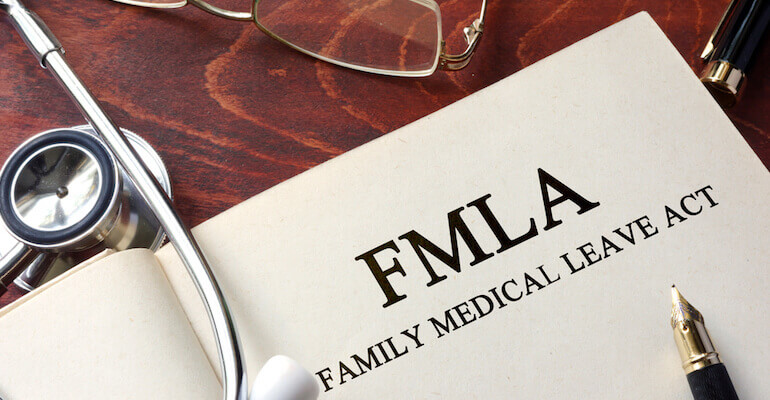
5 Common FMLA Violations & Mistakes Employers Make
What are some common FMLA violations by employers?
Were you denied leave or disciplined for FMLA absences? Eligible employees have a right to take leave for qualifying medical conditions or family circumstances as outlined by the Family and Medical Leave Act (FMLA).
To qualify for FMLA leave, an employee must meet the following basic eligibility requirements: the eligible employee must (1) work for a covered employer; (2) work 1,250 hours during the 12 months prior to the start of leave; (3) work at a location where 50 or more employees work at that location or within 75 miles of it; and (4) have worked for the employer for 12 months.
In addition to these basic requirements the reason for leave must be one of the following:
- the birth, adoption, or foster care placement of a child
- the employee’s own serious health condition
- a family member’s serious health condition
- qualifying exigencies arising out of a family member’s military deployment, or
- a family member’s serious injury or illness arising from military service.
The definition of “family member” covers children, spouses, and parents, but does not include extended family.
What are some common FMLA violations by employers?
Refusing to Recognize Qualifying Conditions
An ailment such as the common cold (not usually covered by FMLA) could turn into a condition that does, such as bronchitis, strep throat, or pneumonia. In addition, eligible employees can also take FMLA leave to care for family members suffering from a serious illness. Therefore, an employer also cannot refuse FMLA to an employee who must care for a child, spouse, or parent who is suffering from a serious illness.
Asking for Notice Too Far in Advance
The FMLA allows employers to outline their own policies when it comes to procedures for an employee to give notice of a need for leave. However, the employer cannot impose procedures contrary to the provision of the FMLA.
The FMLA generally requires that an employee must give 30 days’ advance notice but if 30 days’ advance notice is not possible, notice should be given “as soon as practicable”. In the case of unforeseen leave, again, notice should be given “as soon as practicable.” “As soon as practicable” means as soon as both possible and practicable and will depend on the facts and circumstances of each case. The Regulations to the FMLA provide that it should be practicable for an employee who becomes aware of a need for leave less than 30 days in advance to provide notice of the need for leave as soon as the same day or next business day.
Retaliation for Absences Covered by FMLA
Even if your employer does not fire you wrongful termination when using FMLA because you have used FMLA leave, they may violate the law if you are disciplined for absences covered by the FMLA. An example of this would be an employer that uses a “no-fault” absence policy, which means they count every single absence. Employers cannot, however, count an FMLA absence as a “no-fault” absence because this violates the FMLA.
Not Giving Employees Notice of FMLA Requirements
An employer cannot deny FMLA leave for failing to comply with the employer’s policies for requesting leave, if an eligible employee has not been informed of the proper method or procedure and timeline for filing for FMLA leave.
Failing to Recognize Notice of FMLA Leave
The first time an employee requests leave, the employee does not have to invoke any magic words or even a direct reference to the FMLA to give an employer notice as long as they have provided sufficient information to inform the employer that the leave may be covered by the FMLA, when and how much leave the employee anticipates and the notice was given in time for the employer to act on these obligations.
Have you been denied or retaliated against for eligible FMLA leave?
There are many more FMLA violations by employers that may interfere with or prevent you from exercising your rights to take protected leave. Get in touch with an experienced attorney. Wenzel Fenton Cabassa, P.A., is a Tampa firm of employment lawyers for employees.
SOURCES:
Do You Have an FMLA Claim Against Your Employer
Qualifying Reasons for FMLA Leave
Please Note: At the time this article was written, the information contained within it was current based on the prevailing law at the time. Laws and precedents are subject to change, so this information may not be up to date. Always speak with a law firm regarding any legal situation to get the most current information available.









